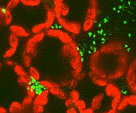Plant Pathology, Department of

Department of Plant Pathology: Faculty Publications
Document Type
Article
Date of this Version
11-2013
Citation
The Plant Cell, Vol. 25: November 2013, pp. 4493–4511.
Abstract
Calmodulin N-methyltransferase (CaM KMT) is an evolutionarily conserved enzyme in eukaryotes that transfers three methyl groups to a highly conserved lysyl residue at position 115 in calmodulin (CaM). We sought to elucidate whether the methylation status of CaM plays a role in CaM-mediated signaling pathways by gene expression analyses of CaM KMT and phenotypic characterization of Arabidopsis thaliana lines wherein CaM KMT was overexpressed (OX), partially silenced, or knocked out. CaM KMT was expressed in discreet spatial and tissue-specific patterns, most notably in root tips, floral buds, stamens, apical meristems, and germinating seeds. Analysis of transgenic plants with genetic dysfunction in CaM KMT revealed a link between the methylation status of CaM and root length. Plants with suppressed CaM methylation had longer roots and CaM KMT OX lines had shorter roots than wild type (Columbia-0). CaM KMT was also found to influence the root radial developmental program. Protein microarray analyses revealed a number of proteins with specificity for methylated forms of CaM, providing candidate functional intermediates between the observed phenotypes and the target pathways. This work demonstrates that the functionality of the large CaM family in plants is fine-tuned by an overarching methylation mechanism.


Comments
Copyright 2013 American Society of Plant Biologists. Used by permission.